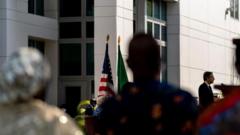In a move that has implications for travel and education, the US has instituted a three-month single-entry visa for most Nigerian applicants, marking a shift in how the nations approach visa allocation.
**Visa Validity for Nigerian Applicants Reduced by US**

**Visa Validity for Nigerian Applicants Reduced by US**
The United States has implemented significant changes to visa policies for Nigerian citizens, limiting entry durations and types of visas.
The United States has recently announced a substantial alteration to its non-immigrant visa policy for Nigeria, which will significantly impact the ability of Nigerian citizens to travel and study in the US. Starting from July 8, nearly all non-immigrant and non-diplomatic visas issued to individuals from Nigeria will be changed to a single-entry format valid for only three months. This marks a noticeable transition from previous policies, where multiple-entry visas allowed for stays of up to two years or more.
The US Department of State attributed these changes to a global reciprocity realignment, stating that the adjustments come as Nigeria currently offers similar visa constraints, with single-entry visas also lasting three months for Americans visiting Nigeria. Although the Nigerian government has yet to release an official statement regarding this policy modification, the implications for both countries' diplomatic relations could be significant.
The State Department has suggested that these visa policies will continue to be reviewed and might be adjusted based on ongoing diplomatic, security, and immigration standards. Emphasizing collaboration with Nigerian authorities, the US aims to ensure compliance with international norms related to secure travel documentation, visa overstays, and the sharing of security and criminal data for public safety purposes.
Moreover, the US has mandated that social media accounts of all visa applicants, including those from Nigeria, undergo scrutiny for potential indicators of hostility towards the US's society, culture, and governance ideals. This heightened vetting process raises concerns about privacy and freedom of expression among prospective travelers.
In terms of education, Nigerians represent one of the largest groups of international students in the US. According to a 2024 report on educational exchange published by the US Department of State, Nigeria ranks as the seventh-largest source of international students, reflecting a 13.5 percent increase in enrollments from 2023.
The decision has prompted reactions within Nigeria, including comments from former president Muhammadu Buhari’s aide, Bashir Ahmad, who indicated that the US's actions may not be purely about reciprocity but reflect a broader discomfort with Nigeria's recent global alignments, particularly following President Bola Tinubu’s participation in the BRICS summit in Brazil.
The evolving visa policies will likely stir discussions about diplomatic relations and travel policies, impacting not just individual travelers but the broader economic and educational interactions between Nigeria and the United States.
The US Department of State attributed these changes to a global reciprocity realignment, stating that the adjustments come as Nigeria currently offers similar visa constraints, with single-entry visas also lasting three months for Americans visiting Nigeria. Although the Nigerian government has yet to release an official statement regarding this policy modification, the implications for both countries' diplomatic relations could be significant.
The State Department has suggested that these visa policies will continue to be reviewed and might be adjusted based on ongoing diplomatic, security, and immigration standards. Emphasizing collaboration with Nigerian authorities, the US aims to ensure compliance with international norms related to secure travel documentation, visa overstays, and the sharing of security and criminal data for public safety purposes.
Moreover, the US has mandated that social media accounts of all visa applicants, including those from Nigeria, undergo scrutiny for potential indicators of hostility towards the US's society, culture, and governance ideals. This heightened vetting process raises concerns about privacy and freedom of expression among prospective travelers.
In terms of education, Nigerians represent one of the largest groups of international students in the US. According to a 2024 report on educational exchange published by the US Department of State, Nigeria ranks as the seventh-largest source of international students, reflecting a 13.5 percent increase in enrollments from 2023.
The decision has prompted reactions within Nigeria, including comments from former president Muhammadu Buhari’s aide, Bashir Ahmad, who indicated that the US's actions may not be purely about reciprocity but reflect a broader discomfort with Nigeria's recent global alignments, particularly following President Bola Tinubu’s participation in the BRICS summit in Brazil.
The evolving visa policies will likely stir discussions about diplomatic relations and travel policies, impacting not just individual travelers but the broader economic and educational interactions between Nigeria and the United States.






















